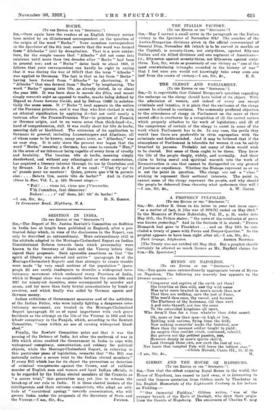THE CLERGY AND PARLIAMENT.
[To THE EDITOR or THE " SPECTATOR."]
Sza,—It is regrettable that Colonel Burgoyne's question regarding the embargo on the clergy should have failed of its object. With the admission of women, and indeed of every one except criminals and lunatics, it is plain that the exclusion of the clergy cannot be allowed to continue. The commonly proffered objection to the attendance' of clergy in Parliament on• the score of their snored office is overborne by a recognition of (1) the- sacred nature which properly attaches to the work of legislation; and (2) of the competence of certain of the - clergy to assist in some of the work which Parliament has to do. In any case, the perils they would face there are preferable- to civic,- segregation with the criminals • and-feeble-minded. And it may be believed that if the atmosphere of Parliament is tolerable for women it can be safely breathed by parsons, Probably not many of them would wish to be elected. But•eome- of them ought to be there. They know the life of the people deeply, widely, and normally, And' their claim to bring moral and spiritual' warmth into the work of Reconstruction is one that cannot be disregarded on any ground of justice or expediency. Whether the Ziahops represent us-or no is not the point in question. The clergy are not a " class " wishing to' represent their sectional interests. The• point is; cannot some of the -clergy represent the people, and why should the people be- debarred from. choosing what spokesmen they will ?










































 Previous page
Previous page